Solar Panel Cleaning: Why It’s Important and How to Do It
Contents
- 1 Solar Panel Cleaning: Why It’s Important and How to Do It
- 1.1 Understanding Solar Panels
- 1.2 Importance of Solar Panel Cleaning
- 1.3 Factors Affecting Solar Panel Dirt Accumulation
- 1.4 DIY Solar Panel Cleaning
- 1.5 Professional Solar Panel Cleaning
- 1.6 Cost Considerations
- 1.7 Safety Precautions
- 1.8 Maintenance and Upkeep
- 1.9 Other Considerations
- 1.10 How To Clean a Lawn Mower
- 1.11 How To Clean A Headstone
- 1.12 How To Clean A Sauna
- 1.13 How To Clean A Concrete Patio
Solar panels are an increasingly popular and eco-friendly way to generate electricity for homes and businesses. However, solar panels are exposed to the elements and can become dirty over time, which can reduce their efficiency and output. That’s why, with solar panel cleaning, it’s important to keep solar panels clean and well-maintained.
Cleaning solar panels is a simple process that can be done by anyone with the right tools and knowledge. While it’s possible to hire a professional for solar panel cleaning, it’s also possible to do it yourself with a few basic supplies. By following the manufacturer’s instructions and using the right cleaning techniques, you can keep your solar panels in top condition and ensure that they continue to generate clean energy for years to come.
Understanding Solar Panels
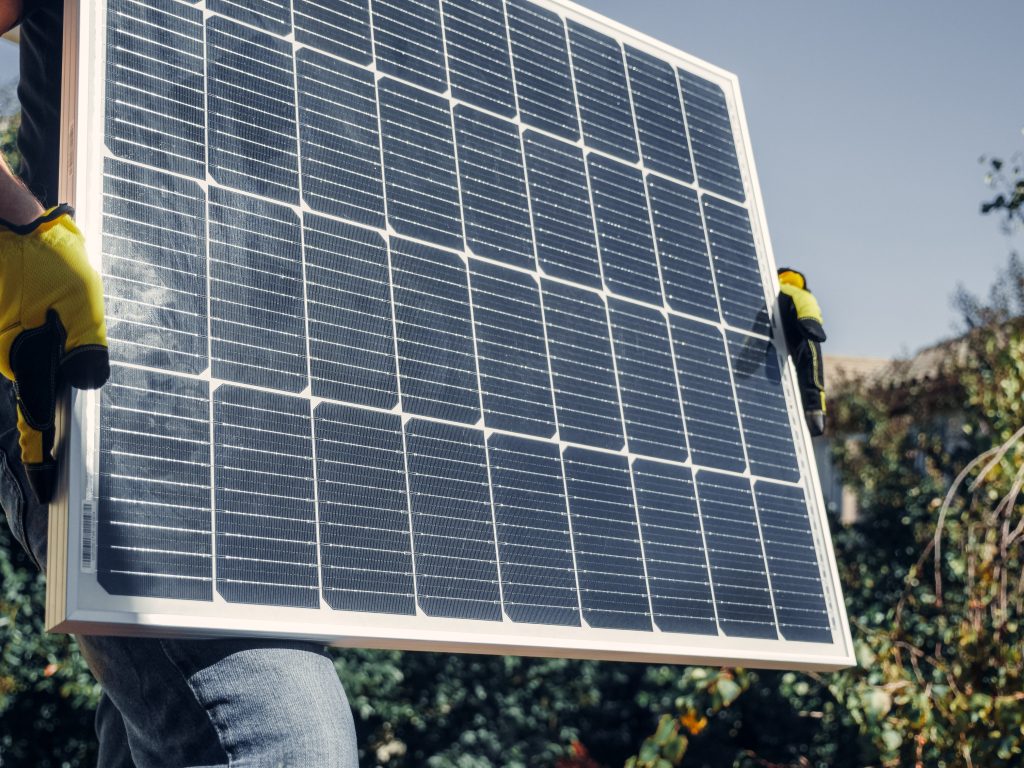
Solar panels are an essential component of a solar system, which is a type of renewable energy system that harnesses the power of the sun to generate electricity. Solar panels are made up of photovoltaic (PV) cells that convert sunlight into direct current (DC) electricity. The DC electricity is then converted into alternating current (AC) electricity, the type of electricity that is used in homes and businesses, by an inverter.
Solar panels come in different sizes, shapes, and efficiencies. The most commonly used solar panels are made of silicon, which is a highly abundant element on Earth. There are two types of silicon solar panels: monocrystalline and polycrystalline. Monocrystalline solar panels are made from a single crystal of silicon, while polycrystalline solar panels are made from multiple crystals of silicon.
The efficiency of a solar panel refers to the amount of sunlight that it can convert into electricity. The efficiency of a solar panel is affected by several factors, including the quality of the PV cells, the size and shape of the solar panel, the amount of sunlight that the solar panel receives, and the temperature of the solar panel.
To ensure that a solar panel system operates at maximum efficiency, it is important to keep the solar panels clean and free from debris. Dust and dirt can accumulate on the surface of the solar panels, reducing their efficiency and output. Regular solar panel cleaning can help to maintain their efficiency and prolong their lifespan.
In summary, solar panels are a crucial component of a solar panel system, and they are responsible for converting sunlight into electricity. The efficiency of a solar panel depends on several factors, including the quality of the PV cells, the size and shape of the solar panel, and the amount of sunlight that the solar panel receives. Regular solar panel cleaning is essential to maintain their efficiency and prolong their lifespan.
Importance of Solar Panel Cleaning
Keeping solar panels clean is crucial to maintaining their efficiency and maximizing their output. Because of the way solar panels work, by collecting photons from sunshine to convert solar radiation into usable electricity, it’s essential that their surfaces remain clean. Any wetness or dirt on the panels can significantly reduce their performance, and over time, it can cause permanent damage.
Studies show that solar panel cleaning can boost their effectiveness by up to 20%. Regular solar panel cleaning also helps to extend the life of the panels, ensuring that they continue to provide a reliable source of energy for years to come. Solar panel cleaning is an essential aspect of maintenance that should be performed on a regular basis to ensure optimal performance.
Dirt, dust, bird droppings, and other debris can accumulate on the surface of solar panels, reducing their efficiency. The accumulation of dirt and debris can create a barrier between the sun’s rays and the solar cells, reducing the amount of light that reaches the cells. This, in turn, reduces the amount of energy that can be generated by the panels. Solar panel cleaning removes this barrier and ensures that the maximum amount of sunlight can reach the solar cells.
Investing in solar panels is a significant investment, and it is essential to ensure that they are well-maintained. Regular cleaning can help to prevent issues such as hot spots, which can occur when a portion of the panel is shaded or covered, causing it to produce less energy than the rest of the panel. Hot spots can cause permanent damage to the panel, reducing its overall performance and lifespan.
In conclusion, regular solar panel cleaning is crucial to maintaining the efficiency and performance of solar panels. It ensures that the panels continue to provide a reliable source of energy for years to come and helps to extend their lifespan. It is an essential aspect of maintenance that should not be overlooked by any solar panel owner.
Factors Affecting Solar Panel Dirt Accumulation
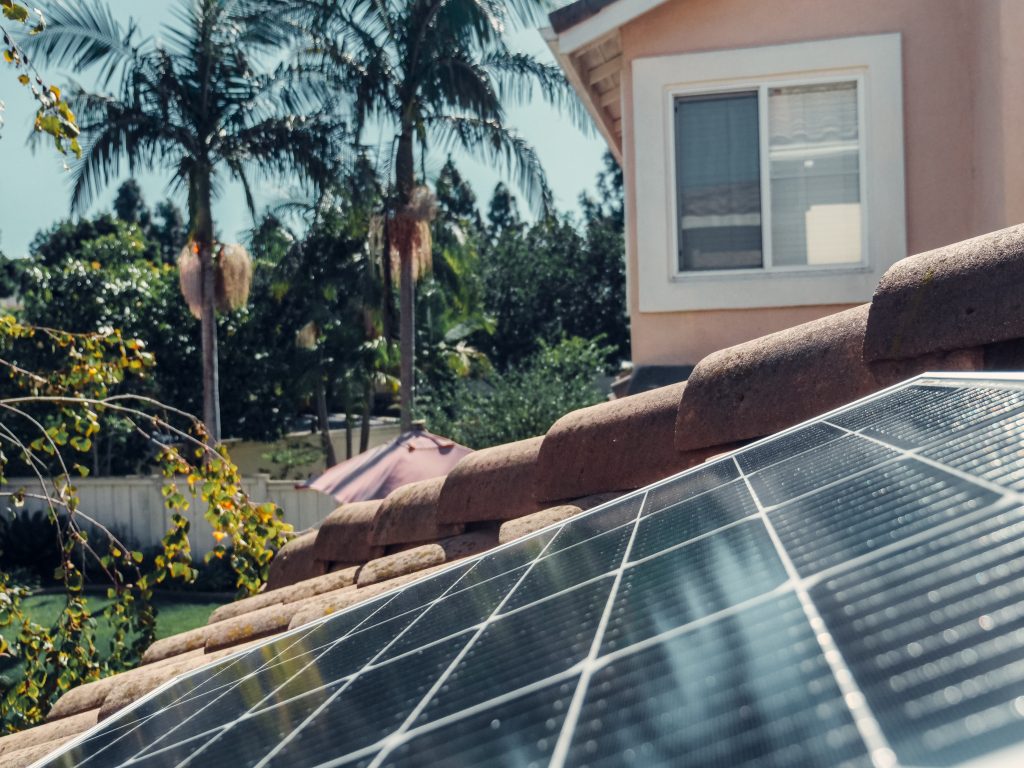
Dirt accumulation on solar panels is a common problem that can significantly reduce their efficiency. Understanding the factors that contribute to dirt accumulation can help in developing effective cleaning strategies. Here are some of the factors that affect dirt accumulation on solar panels:
1. Environmental Factors
Environmental factors play a significant role in the accumulation of dirt on solar panels. Dust, debris, and pollen are some of the common types of dirt that accumulate on panels. The amount of dirt that accumulates on the panels depends on the location and installation of the panels. For instance, solar panels installed in urban areas are likely to accumulate more dirt due to pollution than those installed in rural areas.
2. Climate
Climate also affects the accumulation of dirt on solar panels. Areas with high humidity and rainfall are likely to accumulate more dirt than areas with low humidity and rainfall. Similarly, areas with high winds are likely to accumulate more dirt than areas with low winds.
3. Roof Type
The type of roof on which solar panels are installed also affects the accumulation of dirt. Flat roofs are more likely to accumulate dirt than sloped roofs. This is because flat roofs do not have the natural drainage system that sloped roofs have.
4. Natural Elements
Natural elements such as bird droppings and leaves can also contribute to the accumulation of dirt on solar panels. Bird droppings contain uric acid, which can corrode the surface of the panels and reduce their efficiency. Similarly, leaves can accumulate on the panels and block sunlight, reducing their efficiency.
5. Film Buildup
Film buildup is another factor that contributes to the accumulation of dirt on solar panels. Over time, a thin film of dirt can accumulate on the surface of the panels, reducing their efficiency. This film can be difficult to remove and may require specialized solar panel cleaning techniques.
In summary, several factors contribute to the accumulation of dirt on solar panels. Environmental factors, climate, roof type, natural elements, and film buildup are some of the factors that affect dirt accumulation. Understanding these factors can help in developing effective solar panel cleaning strategies that can improve the efficiency of solar panels.
DIY Solar Panel Cleaning
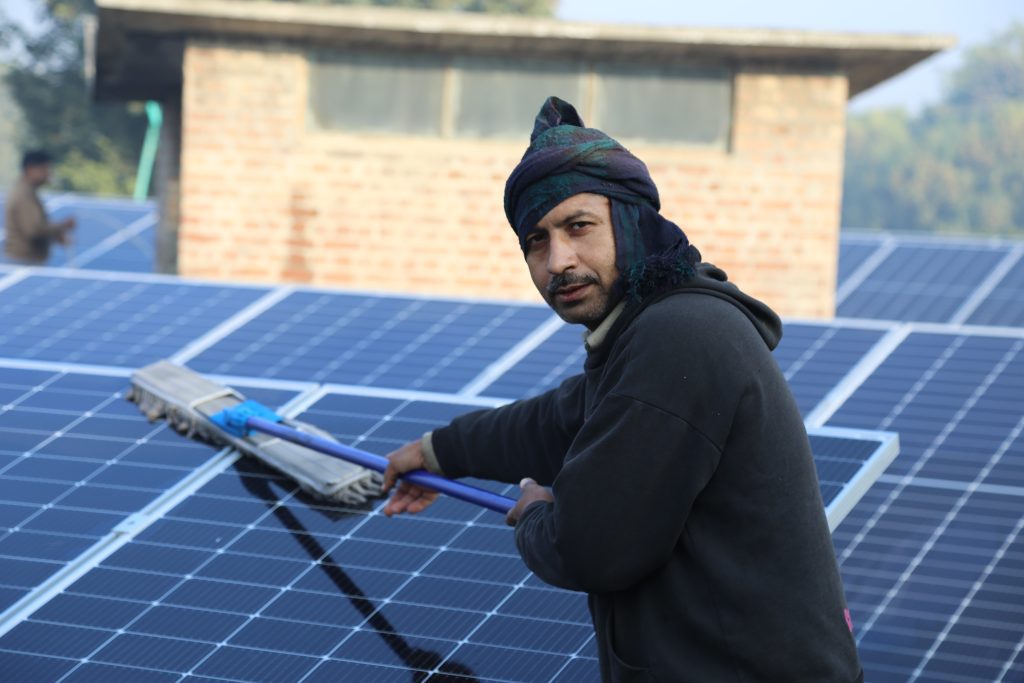
Solar panel cleaning regularly is important to maintain their efficiency and maximize energy production. While professional cleaning services are available, DIY solar panel cleaning is a cost-effective option. Here are some tips to help you clean your solar panels yourself.
Tools and Cleaning Solutions
Before starting, gather the necessary tools and cleaning solutions. The tools required for solar panel cleaning include a garden hose, soft bristle brush, squeegee, sponge, and soft cloth. A pressure washer can also be used, but it should be on a low setting to avoid damaging the panels. For cleaning solutions, a mixture of soapy water or vinegar and water can be used. Avoid using detergents or cleaning products that contain abrasive chemicals as they can scratch the panels.
Solar Panel Cleaning Process
The best time to clean solar panels is early in the morning or in the evening when the panels are cool. Cleaning on an overcast day is also ideal as direct sunlight can cause the cleaning solution to dry too quickly, leaving streaks on the panels.
Begin by rinsing the panels with a garden hose to remove any loose debris. Then, use a soft bristle brush or sponge to apply the cleaning solution to the panels. Gently scrub the panels to remove any dirt or grime. Rinse the panels with clean water using the garden hose or pressure washer on a low setting.
To dry the panels, use a squeegee or soft cloth to remove any excess water. Avoid using a rough or abrasive material that can scratch the panels. If rainwater is available, it can also be used to rinse the panels.
Safety Precautions
When solar panel cleaning on a roof, it is important to take safety precautions. Wear a hard hat and harness if using an extension ladder. Use a roof rake to clear any debris before starting to clean.
In conclusion, cleaning solar panels is an essential part of maintaining their efficiency and maximizing energy production. DIY cleaning is a cost-effective option that can be done with the right tools and cleaning solutions. By following these tips, you can keep your solar panels clean and working at their best.
Professional Solar Panel Cleaning
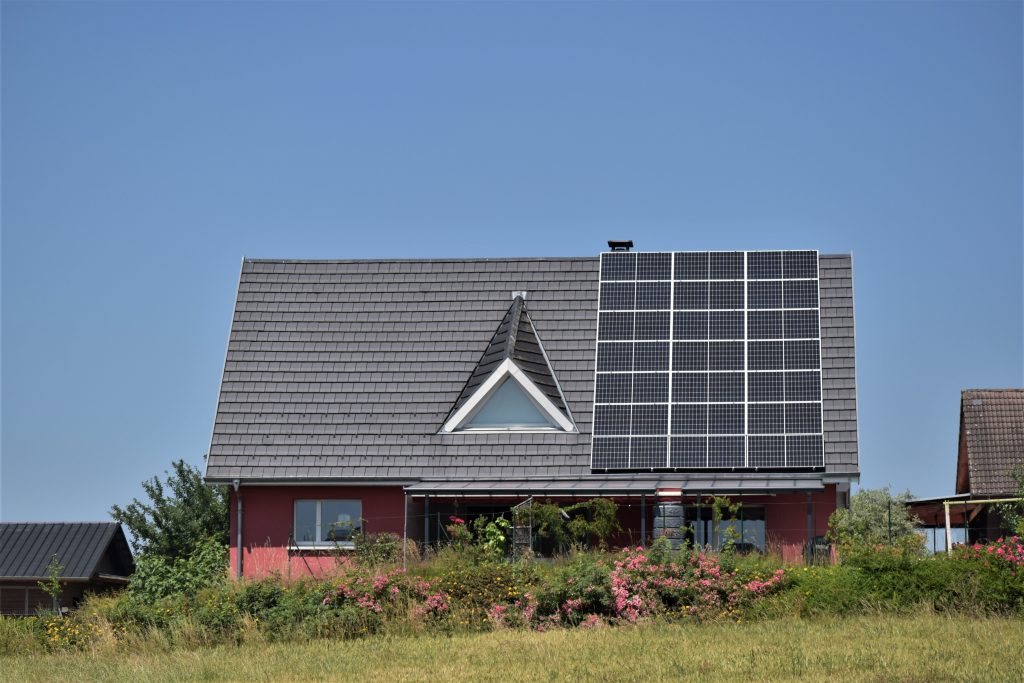
While it is possible to clean solar panels on your own, it is often recommended to hire a professional solar panel cleaning service for optimal results. Professional solar panel cleaning services have the necessary equipment and expertise to clean solar panels safely and efficiently. They can also identify any potential issues or damage that may require repairs.
When hiring a professional solar panel cleaning service, it is important to choose a reputable and experienced company. Look for companies that specialize in solar panel cleaning and have positive reviews from previous customers. It is also important to ensure that the company is insured and licensed.
Professional solar panel cleaning services typically use a combination of water, soap, and specialized cleaning equipment to remove dirt, dust, and debris from solar panels. They may also use soft-bristled brushes or squeegees to avoid damaging the panels. Some companies may use automated cleaning systems that use water and brushes to clean solar panels without the need for manual labor.
The cost of professional solar panel cleaning services can vary depending on the size and number of panels, as well as the location and accessibility of the panels. On average, homeowners can expect to pay between $3 and $10 per panel for professional cleaning services. However, it is important to note that regular cleaning can help maintain the efficiency of solar panels and reduce the need for costly repairs or replacements in the future.
Some solar panel installers may also offer cleaning services as part of their maintenance packages. It may be worth checking with your solar panel installer to see if they offer professional cleaning services or can recommend a reputable cleaning company.
Overall, hiring a professional solar panel cleaning service can help ensure that your solar panels are cleaned safely and effectively, allowing them to operate at maximum efficiency.
Cost Considerations
Solar panel cleaning is essential to maintain the efficiency and longevity of a solar panel system. However, the cost of solar panel cleaning is a common concern for homeowners. The cost of cleaning solar panels varies depending on several factors, including the size of the system, the location, and the cleaning method used.
According to ConsumerAffairs, hiring professional cleaners can cost around $150 per visit. HomeAdvisor estimates that the typical cost to clean a solar panel is between $15 to $25 per panel. Assuming a house has 20 to 25 panels, expect to pay between $300 and $630 a year for cleaning. On the other hand, a home with 10 panels may cost between $150 and $250 to clean.
The cost of solar panel cleaning may seem high, but it is essential to consider the long-term benefits. Clean solar panels can generate more energy, leading to lower energy bills. According to Renogy, dirty solar panels can reduce energy production by up to 25%. By cleaning the panels regularly, homeowners can save money on their energy bills and extend the life of their solar panel system.
It is also important to note that some insurance companies require regular maintenance of solar panels. Neglecting to clean the panels may void the insurance policy, leading to additional costs in case of damage or malfunction.
While professional solar panel cleaning services may seem expensive, there are cost-effective ways to clean solar panels. Homeowners can use a leaf blower to remove dust and debris from the panels or rinse them with a water hose. However, it is important to ensure that the cleaning method used is safe and does not damage the panels.
In summary, the cost of solar panel cleaning may seem high, but it is essential to maintain the efficiency and longevity of a solar panel system. Clean solar panels can generate more energy, leading to lower energy bills and potential savings in the long run. Homeowners should consider the size of their system, the location, and the cleaning method used when determining the cost of cleaning their solar panels.
Safety Precautions
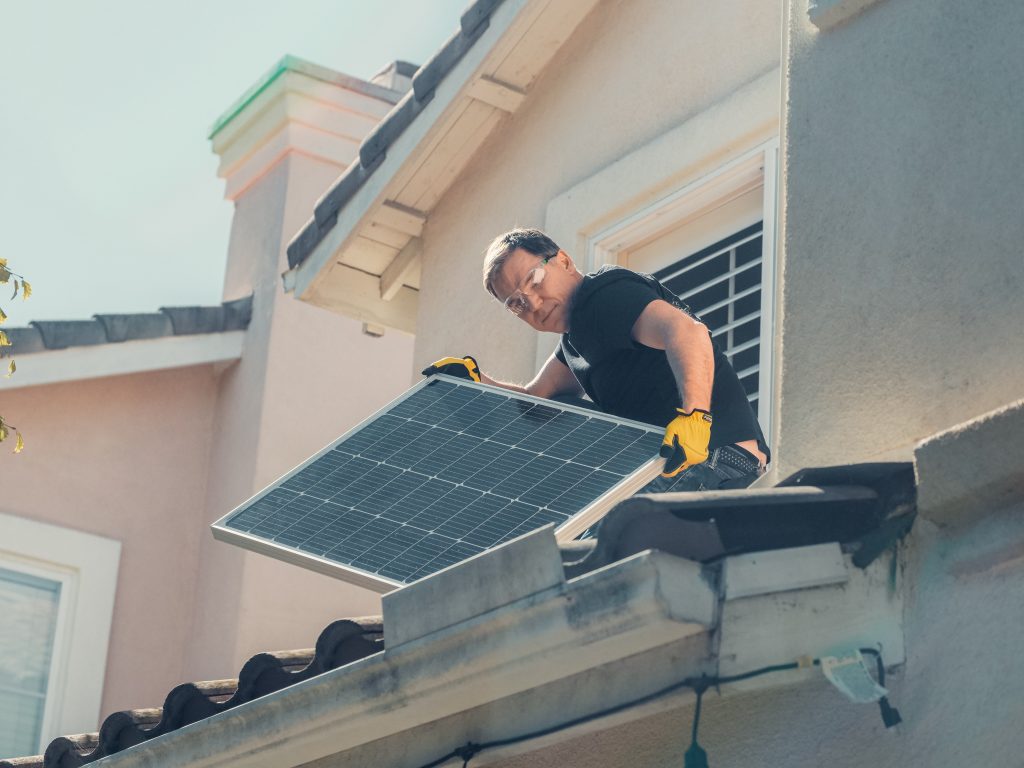
When it comes to solar panel cleaning, safety should be the top priority. The following safety precautions should be taken to ensure a safe cleaning process:
- Shut down the system: Before cleaning, it is important to check the manufacturer’s instructions and shut down the system if necessary. This will help prevent any electrical accidents during the cleaning process.
- Wear protective equipment: Protective equipment such as gloves, safety glasses, and non-slip shoes should be worn to prevent any injuries. It is also recommended to wear a harness when cleaning solar panels on a roof.
- Avoid problem areas: It is important to avoid problem areas such as damaged or broken panels, as well as any areas with exposed wiring or electrical components.
- Perform a visual inspection: Before cleaning, a visual inspection should be performed to identify any potential hazards or problem areas. This will help ensure a safe cleaning process.
- Follow manual instructions: It is important to follow the manufacturer’s instructions when cleaning solar panels. This will help ensure that the cleaning process is done correctly and safely.
By following these safety precautions, homeowners can ensure a safe and effective cleaning process for their solar panels.
Maintenance and Upkeep
Regular maintenance and upkeep are essential to ensure that solar panels continue to perform at their peak efficiency. Solar panels can collect dirt, debris, and other pollutants over time, which can reduce their effectiveness.
One of the most common types of maintenance required for solar panels is cleaning. Dirt and debris can collect on panels, especially during storms or extended periods without rainfall. Regular cleaning can help ensure that panels are operating at their maximum efficiency.
It is important to monitor the performance of solar panels regularly. This can be done by checking the output of the panels regularly and comparing it to the expected output. Any significant drop in output could indicate a problem with the panels that requires attention.
In addition to regular solar panel cleaning and monitoring, it is important to perform regular upkeep on solar panel systems. This can include checking and tightening bolts, replacing damaged or worn components, and ensuring that all electrical connections are secure.
During periods of drought or other extreme weather conditions, it is important to take extra care to ensure that solar panels are operating correctly. This may include monitoring the output of the panels more frequently or performing additional cleaning to remove any accumulated dust or debris.
Overall, regular maintenance and upkeep are essential to ensure that solar panels continue to operate at their peak efficiency. By monitoring the performance of solar panels, performing regular cleaning and upkeep, and taking extra care during extreme weather conditions, homeowners can ensure that their solar panel systems provide reliable and efficient energy for years to come.
Other Considerations
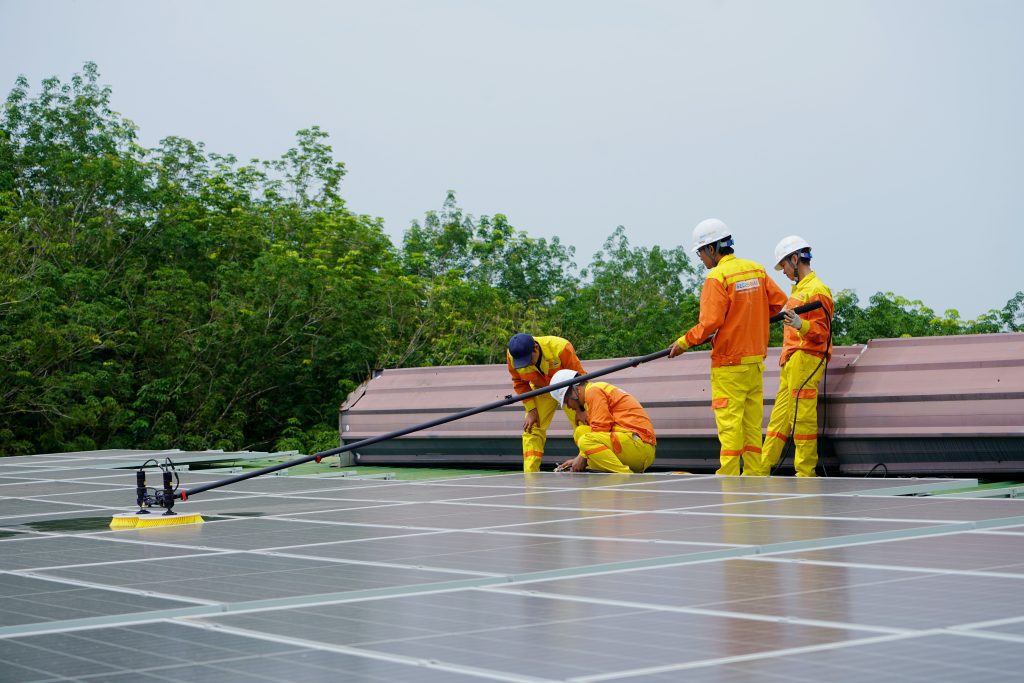
Aside from the regular solar panel cleaning, there are other factors to consider to ensure maximum efficiency and longevity of the system.
Hard Water
If the water used to clean the solar panels is hard, it can leave mineral deposits on the surface, which can reduce the efficiency of the panels. To avoid this, it is recommended to use soft water or distilled water for cleaning.
Tilted Panels
If the solar panels are tilted, it is important to clean them from the bottom to the top, to prevent dirty water from running down and leaving streaks. Additionally, the angle of the panels should be checked periodically to ensure that they are still facing the right direction for maximum sun exposure.
Mineral Deposits
If mineral deposits are left on the solar panels, they can create hot spots, which can damage the cells and reduce the efficiency of the system. To prevent this, it is recommended to use a cleaning solution specifically designed for solar panels, or a mixture of water and vinegar.
Solar Carport
If the solar panels are installed on a solar carport, it is important to keep the structure clean as well, as dirt and debris can accumulate on the panels and reduce their efficiency. Additionally, the carport should be checked periodically to ensure that it is still structurally sound.
Laundry Detergents
It is important to avoid using laundry detergents or other harsh chemicals for cleaning solar panels, as they can damage the surface and reduce the efficiency of the system. Instead, it is recommended to use a cleaning solution specifically designed for solar panels, or a mixture of water and vinegar.
In summary, solar panel cleaning is an important part of maintaining the efficiency and longevity of a solar energy system. By considering factors such as the type of water used, the angle of the panels, and the cleaning solutions used, homeowners can ensure that their solar panels are operating at maximum efficiency.
Further Reading On Solar Panel Cleaning
If you are looking for further reading on solar panel cleaning the see these articles.
- According to solar.com, it’s important to check your panel manufacturer instructions for shutting down the system before cleaning, and to avoid going on the roof to clean your system. Brushing any loose dirt off before spraying them with water will make the squeegeeing process quicker and easier.
- ConsumerAffairs states that most solar panels require at least annual cleaning, but cleaning them more often is recommended. Hiring professional cleaners costs about $150 a visit.
- Forbes Home provides tips and instructions for cleaning solar panels to restore their efficiency and reduce energy costs. The cleaning process is similar to any window cleaning job.
- ResearchGate provides a review of different solar panel cleaning methods, including electrostatic cleaning, super hyperbolic coating, and dust impact.

